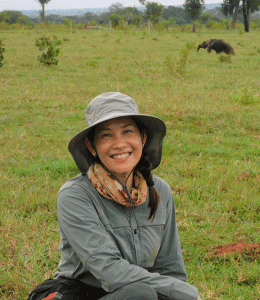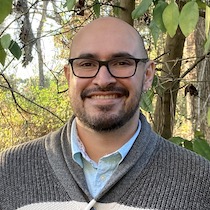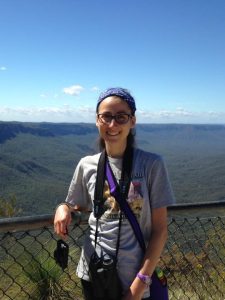The School of Natural Resources and Environment (SNRE) is delighted to announce this year’s recipients of the Nadeau Graduate Research Award, a grant established by the Robin E. Nadeau fund to support research and education in SNRE.
SNRE graduate students can apply for the Nadeau grant to support research and educational activities in both basic and applied contexts such as attending national and international conferences to present research, traveling to accredited institutions to receive training on new research techniques, and conducting field work for data collection.
Here are 2024’s Nadeau Award recipients:
Orlando Acevedo-Charry
Orlando is a biologist from Colombia with a wide variety of research interests. He holds a master’s degree from the University of Puerto Rico and is working towards his Ph.D. His major advisors are Dr. Miguel A. Acevedo, assistant professor in the Department of Wildlife Ecology and Conservation, and Dr. Scott K. Robinson, professor at the Florida Museum of Natural History. His research topics are broad and varied, though he is currently investigating tropical ecology and conservation, biodiversity response to environmental gradients, and the use of citizen science and community-based monitoring with quantitative tools.
“This research award will allow me to tackle part of my three PhD projects, which as an interdisciplinary ecology student could seem sometimes not as connected as we want,” Orlando said. “The main goal of my dissertation is unravelling the mechanisms underlying changes in the distribution of tropical avian communities and the functional adaptations in response to various ecological gradients.”
“I believe that we all continuously learning, impacting different lives with our acts, examples, and mistakes.”
Silvia de Melo Futada
Silvia is a Ph.D. student from Brazil with a master’s degree in Ecology. She has spent the past 20 years working in academic research and civil society duties related to conservation and socio-environmental justice.
“We know that besides an efficient strategy to prevent deforestation and mitigate the climate crisis, protected areas and traditional territories are central to biodiversity conservation,” explained Sylvia. “Indigenous People, Quilombolas, and Traditional communities have been fighting for their rights in embattled, creative and collective ways.”
Silvia plans to study interdisciplinary and political ecology through a collaboration with the Waimiri Atroari, an indigenous group from Brazilian Amazonia. Her proposal includes establishing a collaborative, decolonizing research process that documents their history of territorial management and social arrangements that have helped them resist genocidal policies. Silvia’s major advisors are Dr. Karen Kainer, affiliate SNRE faculty from the School of Forest, Fisheries, and Geomatic Sciences, and Dr. Joel Correia, affiliate SNRE faculty from the Warner School of Natural Resources in Colorado State University.
“A world in which the worlds they create are possible is better for us all.”
Lydia Soifer
Lydia is a Ph.D. student researching the impacts of climate change and land use change on the distribution of tropical epiphytes and their association with microhabitats. With this award, she will be conducting field work at Cerro Chucanti in eastern Panama to conduct surveys on bromeliads up in the trees. Her major advisor is Dr. Brett Scheffers, SNRE affiliate faculty member from the Department of Wildlife Ecology and Conservation.
“I have been interested in the distribution of species since my undergraduate research on orchid distributions in both North Carolina and Puerto Rico,” Lydia said. “This led me to my current research questions, which ask broadly ‘Why are species where they are?’”
Her dissertation explores how climate across multiple spatial scales, from the ground to the canopy of trees and different elevations, influences the distribution of arboreal species.
Ana Yoko Meiga Ykeuti 
Ana Meiga Ykeuti is a Brazilian biologist with a master’s degree in Biodiversity and Conservation, and is now working on her Ph.D. Her major advisor is Dr. Denis Valle, affiliate SNRE faculty member from the School of Forest, Fisheries, and Geomatic Sciences. Her research focuses on wildlife, mainly medium and large mammals. Ana worked with wildlife in areas prone to environmental challenges such as railroads, mining sites, dams, and regions at risk of ecological disaster.
“My research interests are movement and spatial ecology, behavioral ecology, and wildlife conservation,” Ana said. “My current project aims to understand how land use and cover change influence the movement patterns of a vulnerable mammal, the giant anteater, in the Brazilian Savanna.”
To help in her endeavor, Ana has been selected to participate in a two-week training with the School of Animal Behavior at Max Planck Institute in Radolfzell, Germany. Here, she will take part of a competitive training called AniMove which features a collective of international researchers with extensive experience in animal movement analysis, remote sensing, and conservation.
“I will learn from the best experts in the field and gain hands-on experience using techniques and software for movement analysis,” Ana said.
 3
3


